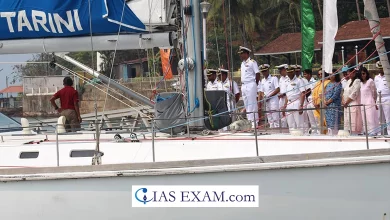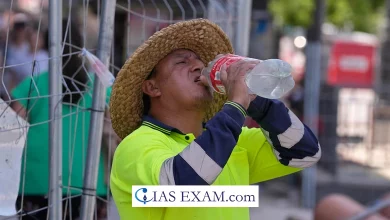Daily Current Affairs for UPSC
Holistic Water Management System in Urban Areas
Topic- Environment Management [GS Paper-3]
Context- With a drastic increase in water demand supply in most of the cities, water management needs to undergo a revolution to ensure most urban areas can be self-sufficient in the future.
Key Highlights
- Around 35% of India’s population were residing in urban areas as of 2020 which is expected to double by 2050.
- In urban areas, only about 45% of the demand is fulfilled using groundwater resources.
- Apart from that, climate change, pollution and contamination have also added the extra burden on water resources.
- As water demand increases supply in most cities, water management needs to undergo a revolution to ensure most urban areas can be self-sufficient in the future.
- In India, there are several water management systems based on utilities like sanitation, urban water, stormwater and wastewater that deal with water-related issues in different localities.
- Since the areas and localities provide a detailed analysis of distribution and water allocation, it is often a challenge to find a unified solution.
- Thus, water management needs to develop a revolution and Integrated Urban Water Management (IUWM) system for better supply which is ensured in most urban areas for self-sufficiency in the future.
Integrated Urban Water Management System
- Integrated Urban Water Management System is a process, which ensures water supply, used water management, sanitation and stormwater management can be planned in line with economic development and land use.
- The entire process helps building coordination among water departments easier at the local level.
- It also makes cities adapt to climate changes and manage water supply more efficiently.
Approaches to Holistic Water Management
Established Coordination
- Clear coordination amongst all the stakeholders, it is easily defined and also it prioritizes accountability.
- While effective legislation will help guide local authorities, engaging local communities will ensure faster solutions in water management.
- It is also important to understand how water is inseparable in its connection to economic development, city infrastructure and land use.
Water as a Resource
- Water is a resource for several end goals hence it will be easier to treat different kinds of water based on agricultural, industrial and environmental purposes.
Customized Solutions
- IUWM insists on specific contexts and local requirements and prioritizes a rights-based solution approach over a one-size-fits-all approach.
Challenges Regarding Water Management in India
- Cities and towns are rapidly growing as a result of rapid urbanisation, and a large influx of migrants from rural areas has increased the per capita use of water in cities, which is causing water to be transferred from rural reservoirs to urban areas to meet the deficit.
- Ineffective Waste Water Management is one of the major challenges to Water Management. In a highly water-stressed environment, the improper use of wastewater is leaving India unable to make the most economical use of its resources. In urban areas, most of this water is in the form of greywater.
- As per a recent report published by the Central Pollution Control Board (March 2021), India’s current water treatment capacity is 27.3% and the sewage treatment capacity is 18.6%.
- Crops and livestock essentially need water to grow. Water is mainly used for irrigation in agriculture and also serves as a major source of domestic consumption.
- With the combination of rapidly declining groundwater levels and inefficient river water management, food insecurity is likely to follow.
- The impacts of water and food scarcity can undermine basic livelihoods and exacerbate social tensions.
- There is a large amount of domestic, industrial, and mining waste that is released into water bodies, which in turn lead to waterborne illnesses. This water pollution can also lead to eutrophication, which can significantly impact aquatic ecosystems.
- 256 of 700 districts in India have experienced critical or overexploited groundwater levels according to the most recent study of the Central Ground Water Board.
- According to a NITI Aayog report India is suffering from the worst water crisis in its history, mentioning that 21 cities- including Bangalore, Delhi, Hyderabad and Chennai have probably exhausted their groundwater resources in 2021.
- Water sources such as wells, ponds and tanks are drying up as groundwater resources come under increasing pressure due to over-reliance and unsustainable consumption and this has escalated the water crisis.





.png)



